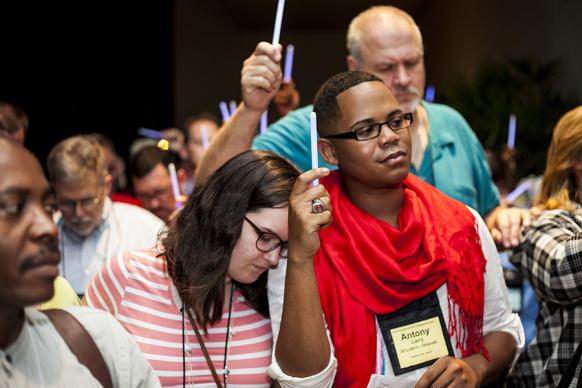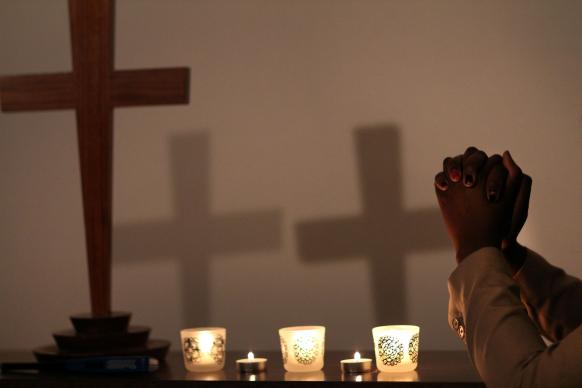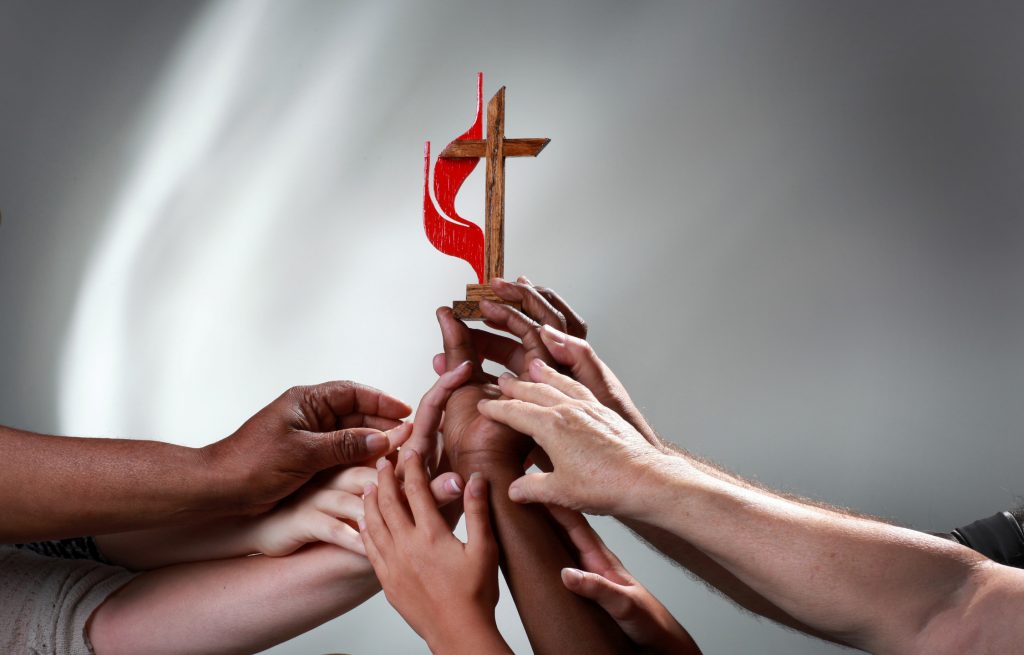 Members of the Florida Conference of The United Methodist Church hold glow sticks during a prayer vigil in response to the mass shooting at Pulse, a gay nightclub in Orlando. Photo by Lance Rothwell, Florida Conference
Members of the Florida Conference of The United Methodist Church hold glow sticks during a prayer vigil in response to the mass shooting at Pulse, a gay nightclub in Orlando. Photo by Lance Rothwell, Florida Conference
Leaders across The United Methodist Church–from bishops to pastors to laity–are calling for heartfelt prayers in their lamentations over the bloody massacre that killed an unprecedented 49 people and injured 53 in Orlando, Fla., early Sunday morning, June 12. The episcopal letters, sermons, blog posts and moments of silent meditation have once again immersed us in public grief that has become all too frequent, as one brutal mass-murder leads inexorably to the next.
The ISIS-inspired terrorism of this incident was familiar. What was different–in regard to mass-killings–was the type of location–a nightclub popular with gay and lesbian patrons–and the description of many victims’ as persons who were mostly LGBTQ and mostly Latino.
Many United Methodists have been struggling during their global and regional conferences in May and June with the perpetual conflict between religious beliefs and beliefs about human sexuality. It is sadly ironic that this horrific attack was waged on a community by a man who, according to his father, may have been driven by his errant, extremist Islamic beliefs and his anger at the affections he witnessed between gay men.

Council of Bishops respond
Some church leaders have addressed both alleged causes of the carnage. Bishop Bruce Ough, writing on behalf of the UM Council of Bishops, expresses shock and horror at “the despicable act of terrorism,” adding, “We stand with our Muslim brothers and sisters who have condemned this heinous act. We pledge to work together to overcome evil with good, terrorism with peace, hatred with love, and inequity with justice.”
But Ough, the council’s new president, also grieves for those who may have been attacked for their sexual orientation, writing, “We pray for the victims, their families, and the LGBTQ community targeted by this hateful attack.” He further calls on United Methodists to not “let evil fill our hearts” but to reject fear and violence, and to “redouble our commitment and efforts to fulfill God’s vision of the Beloved Community throughout the world.”
Likewise, Florida Area Bishop Kenneth Carter Jr. on Sunday urged his congregations to share the message of divine, encompassing love after the deadliest shooting in U.S. history. “Today I am lifting up the clergy and laity who will lead worship in our #Orlando churches. May you announce God’s unconditional love for all people and God’s desire for nonviolence through Jesus Christ, who is our peace.
Many Florida church leaders will travel to Orlando this week for their Annual Conference session that meets simultaneously with Eastern PA’s session, June 16-18. “I hope we can discover creative, pastoral and grace-filled ways to bear witness to all—including lesbian, gay, bisexual and transgender persons,” Carter wrote, “that together we are God’s beloved children. With thousands of us gathered in Orlando this week, what if God is calling us to be a part of the healing?”
Pray and Work
In “Pray and Work,” the Rev. Dan Lebo, pastor of Annville UMC, writes of the frustration of those who tire of “thoughts and prayers, wishing to see action instead.” Amid terrifying tragedies and incomprehensible evil, he asks, “As a pastor, what am I meant to say to church members? As a person of faith, what am I meant to say to myself?”
Lebo shares a timely Latin phrase his Sunday school class just learned: ora et labora. It means “pray and work,” a reminder that the life of faith is one of contemplation and action.
“We pray because we know that without God we don’t stand a chance,” he explains, offering seven faith-affirming reasons why we must pray.
“But we also work,” he continues, offering reasons for that equally essential recourse. “We work because prayer does not remove our responsibility to act. Rather, prayer inspires us to act; to be co-laborers with God.
“Pray for an end to violence and hatred,” Lebo concludes. “Work for an end to violence and hatred. Pray for a brighter tomorrow. Work for a brighter tomorrow. Pray because we can’t do it without God. Work because God won’t do it without us.”

Make love our aim
While many leaders might focus solely on the terrible killings and the aftermath, Eastern PA’s Bishop Peggy Johnson looks more personally and broadly at the underlying disrespect and enmity that endangers oppressed people’s lives simply because of who they are. In her candid response to the Philadelphia Episcopal Area,, titled “No more targets of hate and rejection. Make love our aim!” she begins, “People of color, people with disabilities, women, people who are poor, people who are lesbian, gay, bisexual and transgender all know this: Who you are can be dangerous!”
She cites “target” groups in our society who “get the message” that their lives are constantly at risk “in a million subtle and sometimes life-threatening ways.” But the other message they get, she writes, is “that you are ‘less than,’ and not worthy of the same respect, opportunities and dignity available to those who possess power.”
Johnson recalls the vehement rejection she faced as a young seminary student when she emerged from a safe, segregated, traditional society in the mid-1960s and detoured from her “gender-appropriate” school-teaching career to instead pursue ordained ministry.
“I was challenged on many levels for daring to seek ordination in the man’s world of ministry,” she writes, recalling “the hardest thing” was when classmates would hurl Bible verses like weapons to tell her she was being “unscriptural” to “seek authority that was designated for men only.
“In Christ no one is ‘less than.'” she contends. “God created all of us as equals and as equally precious. No one should be targeted for bias, discrimination, hatred or violence of any kind.”
Johnson calls for prayer for Orlando’s victims and their community and for solutions to end gun violence and terrorism. But she also invites prayer that extends to “our church as it continues to struggle with the debate over human sexuality and ministry that is on the hearts and minds of United Methodists.”
She urges readers to “talk to people who are different from us, around whom we may feel uncomfortable because they have different personalities and perspectives than our own. Listen to their words and hear their hearts.”
And finally, she calls upon people to model humility and civility–“a civil way of walking and talking on this earth, a way that respects all, that rejects violence and hate-filled rhetoric, and that seeks to build bridges of understanding and acceptance.”
Our church can do more
Widespread calls to act, not just pray, probably increase with each tragedy of human cruelty and conflict, as we search for answers in our own behaviors. “In the wake of the shooting, I can’t help but think that our church can do more,” writes Baltimore-Washington Conference Bishop Marcus Matthews, who will preach at the Eastern PA Annual Conference on Friday this week.
Members of his conference wore orange one day during their annual session to symbolize their support for an end to gun violence. But now he asks his congregations to go further in discerning “how you might become advocates for this struggle.” And he adds, “We all must repent for any harm that our collective actions or words might have on the LGBTQ community in this tragedy and beyond.”
Likewise, “We Can Pray and Grieve, but Then We Must Act,” is the response to the Orlando massacre offered by the Rev. Susan Henry-Crowe, who heads the General Board of Church and Society.
“Crimes of hate that terrorize any of God’s children are abhorrent and intolerable,” she writes in a statement. “This time it is against LGBTQ persons and communities. Persons in the LGBTQ community were targeted because of who they are, who God created them to be and to become. We also know that this tragedy deeply affected the Latino community and we hold them all in our prayers. The heartbreak of parents, friends, lovers, congregations and communities is unbearable.”
Crowe cites the “complicity of the church in perpetuating fear and intolerance,” calling among United Methodists to “dismantle the systemic fear, hatred and discrimination that leads to violence against LGBTQ persons and communities.” That includes “legislation and policies in many states that uphold a second class of citizens and stoke the flames of homophobia.”
Three resolutions coming to the Eastern PA Annual Conference session this week relate to that concern for the protection of human and civil rights for LGBTQ persons.
One calls for aggressive support of the Fairness Act, a popular but still unpassed state bill to extend freedom from discrimination in employment, housing and public accommodations to LGBTQ persons.
A similar resolution on “religious freedom” asks the conference to denounce any legislation anywhere that uses that term for laws that would restrict LGBTQ persons’ rightful access to employment, housing and public accommodations.
And the Resolution on Radical Welcome would encourage all churches to open wide their hearts, to paraphrase the conference theme, by welcoming LGBTQ persons, especially LGBTQ youth, who suffer high rates of family rejection, homelessness and suicide. It calls upon churches to hold special events on Sunday, Oct. 9, two days before National Coming Out Day (Oct. 11).
For more perspectives on this tragedy read the UM News Service’s June 13 article, Speaking up after Orlando shootings.
By John W. Coleman
Eastern PA Conference Communications Director
Main photo: Members of the Florida Conference of The United Methodist Church hold glow sticks during a prayer vigil in response to the mass shooting at Pulse, a gay nightclub in Orlando. Photo by Lance Rothwell, Florida Conference
